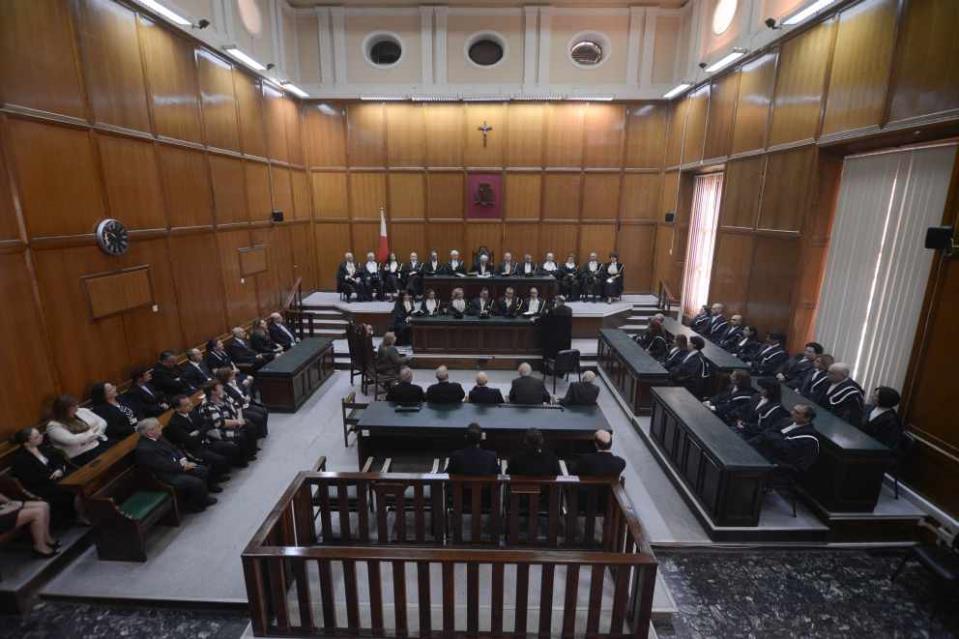The Chamber of Advocates has called for an urgent review in the system of appointment of judges and magistrates, insisting that the candidates should be chosen by a specially appointed authority and that they should have at least 15 years’ experience working in the courts.
The recommendations were made in a position paper presented to the media by the president of the chamber, Dr George Hyzler, who said the timing of the document was a coincidence and was not a reaction to the controversial appointment of two new magistrates by the government last week.
One of the nominees, lawyer Ingrid Zammit Young, has since withdrawn her candidature while the other, Dr Caroline Farrugia Frendo is set to be appointed after 23 February. Her nomination is particularly controversial not only because she has not yet worked the required minimum 7 years as a lawyer but also because she is the daughter of Speaker Anglu Farrugia.

Dr Hyzler said the Chamber of Advocates has been advocating for a change in the judiciary appointment system for years, even before the recommendations of the Bonello Commission. “The present system might have had its positive aspects in the past but is no longer sustainable because it fails to provide the necessary safeguards,” he said.
Dr Hyzler said the chamber wanted a system whereby people with experience are chosen through a transparent and objective process with clear criteria.
“We are recommending the setting up of a Judicial Appointments Authority, which can fall under the remit of the Commission for the Administration of Justice. The authority would consist of the Chief Justice, a lawyer nominated by the Prime Minister, another nominated by the Leader of the Opposition, the President of the Chamber of Advocates and the Attorney General.”

The role of the authority would be to identify eligible lawyers for the post of magistrates and judges. “The chamber does not believe that a public call should be the only way to raise interest in the roles. It should have an active role and approach lawyers who have distinguished themselves in the legal field.”
The names would then be communicated to the Prime Minister and the Justice Minister but should not be made public until a final decision is taken. The reason was to preserve the integrity of the candidates, should they not make the final cut.
Dr Hyzler said the chamber believed that the seven years’ experience currently required was not enough. It is, as such recommending that the requirement be raised to a minimum of 15 years’ experience, 10 of which should be in the courts and tribunals. “Apart from ensuring a greater level of maturity and experience, candidates will likely be more financially stable, ensuring their independence on the bench.”
Prospective candidates will also have to be persons of integrity, honesty and righteousness, and a system will have to be designed to evaluate this requisite. Nominees should also have a good knowledge of the law and have no business connections. “Private business and the roles of Magistrates and Judges are totally incompatible,” Dr Hyzler insisted. Other criteria include the candidate’s financial position, legal publications, post-graduate courses, Bills, sentces, decisions or reports made by the applicant and a peer review.

The applicants’ names would then be presented to the government, along with a detailed explanation of the choice. The Chamber believes that a model where the authority’s conclusions would be final would be superior to one where the government retained the right to choose.
If the country chose a system where the government was not bound to follow the authority’s recommendations, the government should make it clear that the candidate chosen was not presented by the authority.
Dr Hyzler noted that the current administration had put the justice reform as a priority on the national agenda. It was high time, he said, that the Bonello reports comes to life.
Replying to questions by this newspaper, Dr Hyzler welcomed a pledge made by Deputy PM Louis Grech, who said that the judiciary appointment reform would come into force by the end of the legislature. He said, however, that he could not understand why the reform would not be implemented sooner. “Despite requiring changes to the constitution, it is a relatively simple reform and there is the will to proceed from both government and opposition. There should be no delays.”

Fielding other questions, Dr Hyzler said that in the past the Chamber of Advocates would be consulted by the Justice Minister when appointing new members of the judiciary. Yet that “little safeguard” had been done away with in the past few years.
While appointing more people to the bench was important, it was even more so that a proper and transparent process was followed. Asked if the government should hold off any more appointments until the reform comes into force, Dr Hyzler said vacancies cannot be left unfilled but this was another reason why the reform was urgently needed.
Dr Hyzler would not be drawn into commenting on the two recent nominations, insisting that the chamber was not going into the merits of the individuals but questioning the system. He said that candidates should not be excluded just because they were relatives of some public figure – everyone had to be nominated on his own merit.
He again spoke on the need for experience, noting that in some countries lawyers with less than 25 years’ experience in the courts were not even considered for the job. “In my personal opinion one should at least be 40 or 45 years old. But that is my own opinion and there is no agreement in the chamber. While we understand that candidates cannot be too old, they cannot be too young either. To be fair there are some young magistrates and judges who have had great success. But at the end of the day age, experience and maturity go together and people expect a mature judiciary deciding their fate.”
Government welcomes 'constructive proposals'
In a statement the Justice Ministry said it welcomed the chamber’s “constructive” proposals. "The Ministry believes that the chamber’s proposals, although very different to those of the Bonello Commission, are interesting and, while one might not agree on every detail, offer a good base for discussion.”
It thanked the Chamber of Advocates for its role in the national debate and looked forward to more focused and specific discussions with the chamber on the subject.